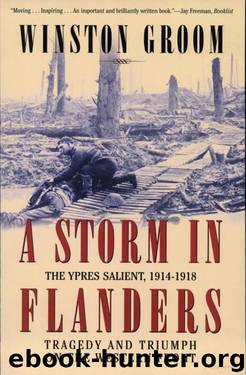A Storm in Flanders: The Ypres Salient, 1914-1918: Tragedy and Triumph on the Western Front by Winston Groom

Author:Winston Groom [Groom, Winston]
Language: eng
Format: epub
Tags: History, Military, World War I
ISBN: 9781555847807
Google: kSAT6W2nPZgC
Publisher: Grove Press
Published: 2007-12-01T06:00:00+00:00
The French field officers had regarded the desperate British counterattacks of the past month, the Official History tells us, as their forefathers once regarded the Charge of the Light Brigade in the Crimea half a century earlier: "Magnificent, but not war." There was much truth in this; at the close of the Second Battle of Ypres there were scarcely 5,000 rounds of British artillery ammunition available for the entire Western Front. In later battles, ten times that much would easily be expended in a single hour. One thing to come out of all the sacrifice and bloodshed was the firm realization that attacks and counterattacks could not be made without overwhelming artillery preparation. The Germans had already figured this out. Where the earlier battles had been, for the most part, "soldier's" battles, Second Ypres, as the Official History points out, "was indeed the first of the new nature of battle, in which the enemy planned that his infantry should merely have to occupy ground from which his guns had driven every living creature, and in which man was not pitted against man, but against material."
In the Ypres Salient, spring drifted into summer—the hundredth anniversary of the Battle of Waterloo had come and gone—and the "wastage"in Flanders continued: hundreds and even thousands of daily casualties from bullets, bombs, shells, gas, disease, or people simply going insane. Poppies and other flowers were blooming profusely in no-man's-land, in soil fertilized by the remains of so many human and animal carcasses and enriched beyond imagination by nitrates from the high-explosive shells. The Germans still occupied Hill 60, but the British had managed to hold the town of Hooge and the stables of the vast Hooge Chateau. The chateau itself remained in German hands, although at that point it was little more than a pile of bricks and dust. To someone at British Headquarters, it did not seem right to occupy the village and the stables and not the chateau; after all, it was where, the previous October, a German shell had killed General Lomax and half a dozen staff officers during desperate hours of fighting in the First Battle of Ypres. Matter of fact, a plan had already been laid.
Ever since the success—albeit temporary—of the great mine explosion at Hill 60, the High Command was ever more convinced that mines were the wave of the future in breaking static warfare. Their shock value was remarkable; the problem was, after the obliterated ground had been taken, how to hold on to it? The Germans understood this, too, and had stationed ready reserves at strategic points in the line, able to move swiftly to eject an Allied advance before it could consolidate. To First Army commander Sir Douglas Haig, and others, the only solution was to keep a large ready reserve themselves, which could be rushed to the conquered ground and set up against counterattacks. Three months later, during the British offensive at Loos, twenty miles to the south of Ypres, this would lead to a rift between Haig and Sir John French that would also contribute heavily to the latter's downfall.
Download
This site does not store any files on its server. We only index and link to content provided by other sites. Please contact the content providers to delete copyright contents if any and email us, we'll remove relevant links or contents immediately.
| Africa | Americas |
| Arctic & Antarctica | Asia |
| Australia & Oceania | Europe |
| Middle East | Russia |
| United States | World |
| Ancient Civilizations | Military |
| Historical Study & Educational Resources |
The Guns of August by Barbara Wertheim Tuchman(923)
Uniforms of the German Solider by Alejandro M. de Quesada(865)
A World Undone by G. J. Meyer(843)
The-Odyssey by Unknown(823)
The Treaty of Versailles by Michael S. Neiberg(819)
Catastrophe 1914: Europe Goes to War by Max Hastings(799)
I by Anonymous(799)
The Ghost Ships of Archangel by William Geroux(772)
They Called it Passchendaele by Lyn Macdonald(705)
8.4 by Peter Hernon(692)
1914-1918: The History of the First World War by David Stevenson(678)
The Oxford Illustrated History of the First World War by Hew Strachan(662)
Goodbye to All That (Penguin Modern Classics)(647)
August 1914 by Bruno Cabanes(630)
Seven Pillars of Wisdom : A Triumph (9780804170826) by Lawrence T. E(626)
Animals In War by Jilly Cooper(609)
First World War For Dummies by Seán Lang(608)
Defending Gallipoli by Harvey Broadbent(607)
Russia Against Napoleon: The True Story of the Campaigns of War and Peace by Dominic Lieven(595)
